
�ʶ��� ��ɾ��Ӹ���������˼���Ӣ����ӣ�ÿ��һ�ʡ�
1.��������ң������ǵ�һ�μ���ʱ��Ӧ�����֡�
In many countries, friends are _________shake hands when they meet for the first time.
2.���Ϻ���ɺ����ϲ���Ȿ�顣
____Mandy _____Susan likes this book.
3.�ڿ�ѧ���ǵ�Ŭ���£��й��Ѿ��ܹ������� C919 �����Ĵ�ɻ���
With scientists�� great efforts, China has _________to make big planes like C919.
4.Ϊ��ʵ���й��Σ����DZ���Ŭ��ѧϰ������
____to achieve our Chinese Dream, we must study and work hard.
5.2018 �����籭��Ҫ�����ˡ�����������Ȥ��
Are you _________World Cup 2018 which is coming soon?
1. supposed to 2. Neither nor 3. been able 4. In order 5. interested in �������� 1.��������ң������ǵ�һ�μ���ʱ��Ӧ�����֡�����be supposed to do sthӦ����ij�£����� supposed to 2.���Ϻ���ɺ����ϲ���Ȿ�顣���� neither--- nor --... ����ʦ��Сһ����ʦ������ҵϵ�д�
����ʦ��Сһ����ʦ������ҵϵ�д�
| �꼶 | ���пγ� | �꼶 | ���пγ� |
| ��һ | ��һ��ѿγ��Ƽ��� | ��һ | ��һ��ѿγ��Ƽ��� |
| �߶� | �߶���ѿγ��Ƽ��� | ���� | ������ѿγ��Ƽ��� |
| ���� | ������ѿγ��Ƽ��� | ���� | ������ѿγ��Ƽ��� |
��Ŀ������Ӣ�� ��Դ���㶫ʡ2018����꼶��ѧ��һģ����Ӣ���Ծ� ���ͣ��Ķ���ѡ
When my first wartime Christmas came, I was in basic training in New Jersey and not sure if I would make it home for the holidays. Only on the afternoon of December 23 was the list of men who would have the three-day holiday posted. I was one of the lucky soldiers. It was Christmas Eve when I arrived home, and a little snow had fallen. Mother opened the front door. I could see beyond her, into the corner of the living room where the tree had always stood, there were lights, all colors, and ornaments (��Ʒ) shining against the green of a pine.
��Where did it come from?�� I asked.
��I asked the Gates boy to cut it,�� my mother said. ��I wouldn��t have had one just for myself, but when in great need��such a rush! He just brought it in this afternoon.��
The pine reached to the proper height, almost to the ceiling, and the Tree Top Crystal Star was in its place. A few green branches reached out a little awkwardly(�ѿ�) at the side, I thought, and there was a bit of bare trunk showing in the middle. But the tree filled the room with warm light and the whole house with the pleasant smell of Christmas.
��It��s not like the one you used to find,�� my mother went on. ��Yours were always in good shape. I suppose the Gates boy didn��t know where to look for a better one. But I couldn��t be fussy because he had tried his best.��
��Don��t worry,�� I told her. ��It��s perfect.��
It wasn��t, of course, but at the moment I realized something for the first time: all Christmas trees are perfect.
1.What did his mother��s Christmas tree look like?
A. 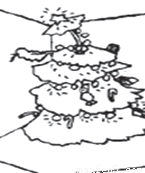
B. 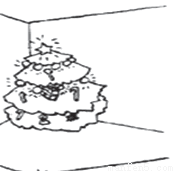
C. 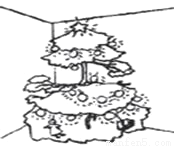
D. 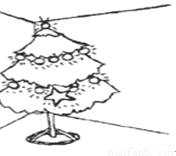
2.Which of the following is TRUE according to the story?
A. One soldier told the writer he would have a three-day holiday for Christmas.
B. When the writer got home, the Gates boy was cutting a Christmas tree.
C. His mother would not complain for the Christmas tree which looked awkward.
D. All the soldiers were lucky to go home for Christmas during the war.
3.From the passage, we can infer that ___________.
A. the writer spent his first Christmas during the war
B. the writer didn��t like the tree cut by someone else
C. the writer used to cut very beautiful Christmas tree
D. his mother didn��t want to have a Christmas tree during wartime
4.What does the writer mean by saying ��all Christmas trees are perfect��?
A. Nothing is as perfect as Christmas.
B. Once at home, everything is so nice.
C. During the war, trees are hard to find.
D. All Christmas trees are the most beautiful.
5.Which would be the best title for the passage?
A. A Soldier and the Christmas Tree B. How Soldiers Spent Christmas
C. The Perfect Christmas Tree D. Christmas and a Special Tree
1.C 2.C 3.C 4.B 5.C �������� ���Ľ��������ߵ�ĸ����ʥ�����ҵ���ʥ������̫��������������ΪֻҪ��ʥ����ʱ�������п�ʥ�������Ǿ��������ġ� 1.C �����ж��⡣����The pine reached to the proper height, almost to the ceiling, and the Tree Top Crysta...�鿴�𰸺ͽ���>>
��Ŀ������Ӣ�� ��Դ������ʡ������2018����꼶��У���������п�Ӣ��ģ���Ծ�11 ���ͣ���ѡ��
�� What do you often do after class?
�� We often take part in after-class activities. I like to play _______ basketball, but my brother likes to play________ guitar.
A. a; the B. the; the C. ����; ���� D. ����; the
D �����������⣺�����κ����Ǿ�����ʲô���������Ǿ����μӿ�������ϲ���������ҵܵ�ϲ�������������⿼�鶨�ڴʵ��÷�����һ���ձ�ʾ���������˶��������˶�ǰ�治�ӹڴʣ��ڶ����ձ�ʾ���ࡢ������������������ǰ��Ҫ�Ӷ��ڴ�the�����ѡ���֪Dѡ��������⣬�ʴ�ѡD���鿴�𰸺ͽ���>>
��Ŀ������Ӣ�� ��Դ���㽭ʡ������2018���п�Ӣ���Ծ� ���ͣ��Ķ���ѡ

1.The purpose of the charity drive for Grace Orphanage is to
A. encourage children through reading
B. teach children to draw pictures
C. introduce some local performers
D. raise money for children aged 5 to 12
2.According to the text�� we can in the charity drive
A. play yo-yo with the volunteers
B. give away used books to kids
C. watch performances on Saturday
D. enjoy children��s TV programs
3.The text might be
A. a news report B. a meeting notice
C. an advertisement D. a science story
1.A 2.B 3.C ����������ƪ����������һ�δ��ƻ�Ĺ�棬��λ����ҪĿ���Ǹ�һ���¶�Ժ�ĺ��������飬��������Щ�����ǡ�ͬʱ�����л��������й���λ������������� 1.ϸ�������⡣���ݶ�����Help develop and inspire our children through reading��֪����δ��ƻ��Ŀ����ͨ�������������ͼ��������ǡ��ɴ˿�֪Ӧѡ...�鿴�𰸺ͽ���>>
��Ŀ������Ӣ�� ��Դ��2018�㽭�����п��Ծ�Ӣ��� ���ͣ��Ķ���ѡ

Every night in Jinan University in Guangahou�� a group of students plays diabolo������ as a crowd watches on in amazement.
Chen Zhelun��25��a malaysian-chinese started the diabolo club�� which helps to increase the popularity of this traditional Chinese game. He is one of many students expressing their interest in the country��s cultural heritage���Ų��� by starting clubs.
The diabolo�� which came from China�� is popular among Chinese living in Malaysia.
��We played diabolo from primary school onward. I thought I could find someone to
play with in China�� but only a few students knew about it. So I started a club to develop
it.�� says Chen
To Chena surprise�� the old game has interested a huge crowd-more than 1��000 students have joined the club.
��It keeps your body strong and it��s fun�� ��says Chet
prefer quieter activities. Every weekend�� one classroom in Shenzhen University is alwayscrowded�� but it��s unusually silent. The members of Lanting Calligraphy Club are writing Chinese characterswith traditional brushes
Fan Dongling�� 21�� a student in Shenzhen University�� says it��s a shame that young people no longer enjoythe beauty of Chinese characters.
Although her club is quiet�� Fan says it keeps members healthy�� mentally and physically
Stiva
Christmas or Valentines Day�� but they seldom pay attention to traditional ones�� ��says Kong Yanquan�� 21�� astudent in Guangxi University.
As head of the traditional Chinese local operas club�� Kong plans to put modern elements��Ԫ�أ�intotraditional culture to get students to join his club
I think it��s everyones duty to save and develop china��s traditional culture among young people�� ��he says.
1.The passage is organized by giving three .
A. examples B. tasks C. lessons D. speeches
2.The underlined word��Tt�� in Paragraph6 refers to��ָ����
A. watching diabolo shows B. playing diabolo
C. talking about old games D. going to primary school
3.It can be learned from the passage that Fan Dongling
A. comes from Malaysia B. is good at local operas
C. loves quiet activities D. is interested in sports
4.Kong Yanquan advises young people to
A. practice writing Chinese characters B. celebrate Western festivals
C. pay attention to traditional culture D. make friends with the elders
1.A 2.B 3.C 4.C ����������ƪ����ͨ��������������������ǽ����˼�����ѧ��ѧ����ͨ��������ֲ�����ʽ�������й���ͳ�Ļ��� 1.��ּ�����⡣������������½ṹ��֪����ƪ���Ľ�����������ѧ�����ѧ���ÿ�����ֲ�����ʽ�������й��Ĵ�ͳ�Ļ�����һ�������ϴ�ѧ�Ŀ�����ֲ����ڶ��������ڴ�ѧ���鷨���ֲ�������һ���ǹ�����ѧ���й��ط�Ϸ�����ֲ�������������þ�������ʽ...�鿴�𰸺ͽ���>>
��Ŀ������Ӣ�� ��Դ��2018���Ĵ��˱��п�Ӣ���Ծ� ���ͣ��Ķ���ѡ
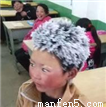
Wang Fuman is a 10-year-old student. He is now studying in
Zhuanshanbao Primary School in Zhaotong, Yunnan Province. On Monday morning (January 8, 2018), he braved -9�� weather to travel over an hour to reach his school.
When he arrived, his hair and eyebrows had been completely frozen with snowflake (ѩ��). This made his 16 classmates laugh a lot. Fu Heng,
Wang��s teacher saw this and took a picture. He uploaded (�ϴ�) Wang��s picture. The picture soon has got much attention to children from poor families in the countryside. Wang, who has been
nicknamed ��Snowflake Boy�� by netizens, became famous online overnight. By Wednesday morning, his picture had been ��liked�� more than 260,000 times on Sina Weibo and shared more than 40,000 times.
After hearing Wang��s story, the Yunnan China Youth Development Foundation held a public donation ( ����) activity for children from poor families. The Foundation has promised to
give each poor child 500 yuan ($75) to help them stay warm in winter.
By 1 pm on Wednesday, the Foundation had collected about 300,000 yuan in public donations, according to their website. Wang��s village now has electricity and tap water, ����and
my family is getting help to build a new house close to the school��, Wang said, ��I think our life will get better.��
1.What was the weather like on Monday morning?
A. Snowy and cold. B. Rainy and cold. C. Snowy but warm. D. Rainy but warm.
2.Why did the classmates laugh when Wang entered the classroom?
A. Because he lost his books . B. Because he told a joke.
C. Because he looked funny. D. Because he was late.
3.The Foundation held a public donation to help the poor children .
A. stay happy B. keep healthy
C. stay educated D. keep warm in winter
4.What can we know from the text?
A. Zhaotong��s weather in winter is warm.
B. Wang��s future life may become better.
C. Wang��s village had electricity before.
D. Few people shared the boy��s picture.
1.A 2.C 3.D 4.B �����������½�����ѩ���к��������Ĺ��¡� 1.����On Monday morning (January 8, 2018), he braved -9�� weather to travel over an hour to reach his school.��his hair and eyebrows had been completely...�鿴�𰸺ͽ���>>
��Ŀ������Ӣ�� ��Դ������ʡ������2018���п�Ӣ���Ծ� ���ͣ��Ķ���ѡ
�Ķ������ͼ�������43��45С�⡣
Indoor Water Park | |
Opening time | ��9: 00a.m.--6:00p.m. from Monday to Friday ��8: 00a.m.- 10: 00p.m. from Saturday to Sunday |
Ticket price | ��Adults: 150 yuan/person: 130 yuan/member ��Children: above 1.2 meters, 75 yuan/person; 60 yuan/member under 1.2 meters. free |
Should not take | food, pets, knives, rings |
Things to remember | ��Children under 1. 4 meters and old people above 60 should stay with other adults ��You should follow the rules in the water park. ��If you have some health problems and aren��t suitable for water activities, you'd better not come in |
1.How long is the water park open on Tuesday?
A. For seven hours B. For eight hours C. For nine hours
2.An adult member and a child member(above 1.2 meters)should pay_____ for the tickets.
A. 190 yuan B. 205 yuan C. 225 yuan
3.What can visitors probably take to the Indoor Water Park?
A. Rings B. Food C. Mobile phones
1.C 2.A 3.C ������������һ������ˮ�Ϲ��Ĺ�档 1.����9: 00a.m.--6:00p.m. from Monday to Friday��֪���ڶ�����9��Сʱ����ѡC 2.����Adults: 130 yuan/member�� Children: above 1.2 meters, 60 yuan/member��ѡA 3.���� Should ...�鿴�𰸺ͽ���>>
��Ŀ������Ӣ�� ��Դ������ʡ��Ǩ��2018���п�Ӣ���Ծ� ���ͣ��Ķ���ѡ
Where can you learn about the cultural relies(����)of our country? You may visit mu seums or read books, but now a CCTV show may give you a more fun way to learn about them.
The show is called National Treasure, it has 10 episodes (��) it shows 27treasures from 9 museums across China. In order to make ancient culture relics come alive, the show uses different ways to explain the story history and culture behind them.
Although it's a show about old relics, it looks modern and technical(������),An IMAX-sized LED sired screen on the stage shows the treasures in detail.
The treasures are presented(����) by National treasure keepers(�ػ���), both famous people and common people. Instead of just telling the stories and history behind the treasures, the show invites famous actors to be national treasures keepers, And they act out, this stories on the stage. The actors even use the funny words to make their performances interesting and alive. For example, on the show, actor wang Kai played Emperor Qianlong TV viewers loved his performances.
While telling the stories behind the treasures, National treasure keepers also tell their own stories. For example, an old man named Qiu Qingnian is good at making natural paints for repairing ancient paintings. For many years he has been looking for mines(��) deep inside mountains. On the TV program, he shows TV viewers how to make natural paints.
The show has become widely popular with its interesting plots(���), good performances and funny words. It has promoted (�ƹ�)ancient cultural relics and has encouraged more people to visit museums.
1.The show National Treasure was produced to___________.
A. look for national treasure keepers
B. make ancient cultural relics come alive
C. show the modern technology
D. invite some famous actors to act out
2.From the passage, we can learn something about the show National Treasure Except ________.
A. actors good performances B. the stories with interesting plots
C. Qiu Qingnian's memes D. the history and culture behind
3.What column(ר��)in a magazine might the passage come from?
A. Health B. History and culture C. Sports D. Science and technology
4.The writer's main purpose of writing the passage is__________
A. to tell us what national treasure keepers do
B. to explain why National Treasure is popular
C. to teach us the ways of making natural paints
D. to introduce the TV show National Treasure
1.B 2.C 3.B 4.D �����������Ȿ�Ľ������������̨�����ļ�¼Ƭ�����������þ�������Ȥ����ڡ����ʵı��ݺͻ��������ֶ����ܻ�ӭ��ͬʱ�ٽ��˹Ŵ�����ķ�չ������������˲ι۲���ݡ� 1.���⣺��¼Ƭ����������Ϊ �������ġ�����ϸ�������⡣����In order to make ancient culture relics come alive, the sho...�鿴�𰸺ͽ���>>
��Ŀ������Ӣ�� ��Դ���ʰ�����꼶�� � ����ѡ�� ר������ ���ͣ���ѡ��
I have been to quite a few restaurants, but I can. say this one is .
A. good B. better C. the better D. the best
D �������� ������⣺��ȥ�����Ҳݣ������ҿ���˵��Ҳ�����õġ�good�õģ�better���õģ�the better���õģ�the best��õġ�����I have been to quite a few restaurants��֪�˴��Ƚϵķ�Χ���������ϣ��������ݴʵ��������ѡD���鿴�𰸺ͽ���>>
����ʡ������Υ���Ͳ�����Ϣ�ٱ�ƽ̨ | �����к���Ϣ�ٱ�ר�� | ����թƭ�ٱ�ר�� | ����ʷ���������к���Ϣ�ٱ�ר�� | ������Ȩ�ٱ�ר��
Υ���Ͳ�����Ϣ�ٱ��绰��027-86699610 �ٱ����䣺58377363@163.com